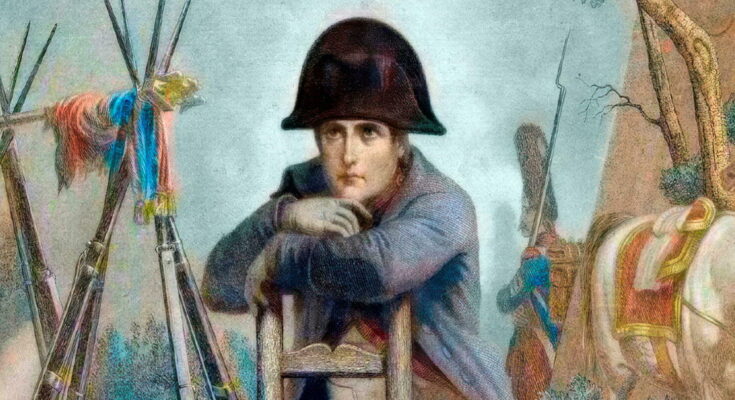S’There are indeed people who force fate and believe in their lucky stars, that is indeed Napoleon. And how can we not believe it when we see his journey and the good fortune that has accompanied him for so long? This impostor spent his time on the battlefield and saw nearly twenty horses injured or killed under him… Not to mention the numerous assassination attempts.
“Remember that I walked accompanied by the god of war and the god of fortune,” he said of the coup he carried out in 1799. In fact, the conqueror was truly superstitious, as the work shows. Black Cat Napoleon (Ed. du Cerf) *, in-depth work by Alexandra W. Albertini and Marie-Paule Raffaelli. But both authors show that this taste for the supernatural was also influenced by his deeply Cartesian mind, which was formed in the spirit of the Enlightenment.
Friday the 13th, golden beetles… and the fairy Joséphine
The origin of his beliefs is his mother Letizia, a very superstitious Corsican. His son would always maintain established traditions: he did not hesitate to make the sign of the cross three times when he heard bad news, curled his fingers to ward off the evil eye, was convinced that certain people brought bad luck and should be avoided or excommunicated… He was uncompromising on the number 13 and Friday, the day of Christ’s passion, which always brought bad luck in his eyes, even if he had to postpone his departure on that day. He told of the night of his life in Las Cases that he was “born with a tendency to be superstitious.”
He is also sensitive to the amulet, which is supposed to protect him. Therefore, his mother entrusted him with a piece of blessed cloth associated with the cult of Our Lady of Mount Carmel, the author explains. From Egypt, he brought back a golden scarab given to him, which he always carried with him. “I confess, I sometimes had the weakness to even believe that he had saved me from disaster,” he confided one day to the Austrian Chancellor Metternich, who inherited him at the birth of the King of Rome – in his eyes, his son became his new talisman for the future.
But his greatest lucky charm was undoubtedly his first wife, Joséphine, whose miniature portrait he kept inside his frock coat. “I put my hand to my heart: your portrait beats there and I look at it. What a miracle, my sweet friend, who will only end up with me,” he wrote to her in 1796. One day when the portrait fell and the ice broke, he suddenly turned pale, believing that something terrible had happened…
In this taste for the supernatural, Joséphine takes over Letizia: the future empress grew up in Martinique, where voodoo was practiced, she was sensitive to cards, to divination, to premonitions. Napoleon was convinced that she was not only his heart’s chosen one, but also his destiny, his soul mate and a good fairy who would accompany him to the top. He was not far from thinking that Napoleon’s power implied magic…
Pragmatic approach to religion
But Bonaparte was also a mathematician, he was an artilleryman, he grew up in the Age of Enlightenment, hence reason, which tempered and ruled. As a good Cartesian, he was wary of thoughts fueled by imagination and of charlatans who exploited them: he then captured Mademoiselle Lenormand, Joséphine’s long-time personal astrologer and astrologer, who disturbed him and whose beliefs about his intimate life he greatly feared. In 1810, the Criminal Code even sentenced “criminals”, fortune-tellers and supernatural mediums to five years in prison… If the Emperor still believed in his stars, doubts arose when he began to stumble in the face of his enemies: as time passed, his beliefs grew, his good fortune ebbed and with them, irrational beliefs.
What about his beliefs? Napoleon said that he was by no means an atheist, but he had a very pragmatic approach to religion: religion serves to strengthen the fabric of a nation, so the Concordat was signed. “Imposed to his childhood, religion was a powerful ally in consolidating his power and placing him on a throne that was both temporal and messianic,” explain the two authors. In the great human architecture desired by God, the Emperor becomes a key figure, who leads his people, as Christ guided his people. In his eyes, good believers are always good citizens.
In the end, Napoleon’s chameleon experienced a form of spiritual confusion, between faith and reason. His taste for the supernatural is that of an “enlightened thinker,” concludes Marie-Paule Raffaelli. “His superstitions served to establish his rationality. He was convinced that from the signs, which he interpreted in the universe and which were intended for him, he would be able to create a more rational political and social world. He rationalized his extraordinary destiny through the prism of his superstition, as it were. And this belief was strengthened by him by seeing his extraordinary success. »
To find
Kangaroo today
Answer
* Black Cat Napoleon, Emperor and superstitionby Alexandra W. Albertini and Marie-Paule Raffaelli, Éditions du Cerf, 22.90 euros.



